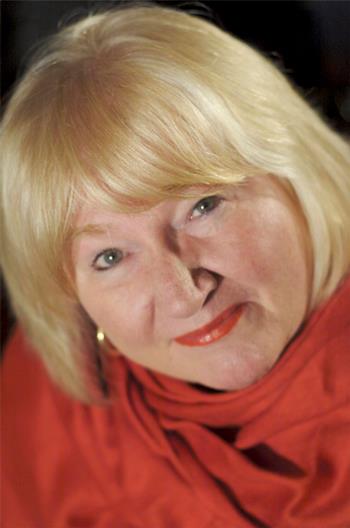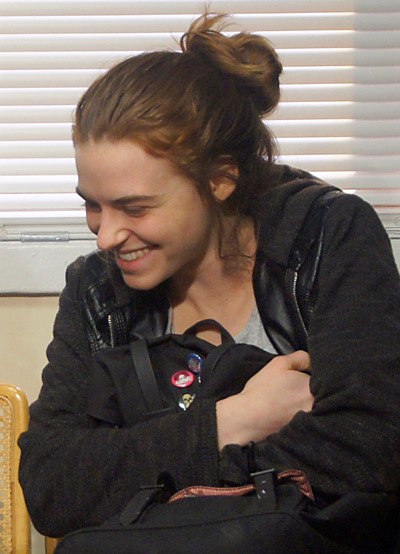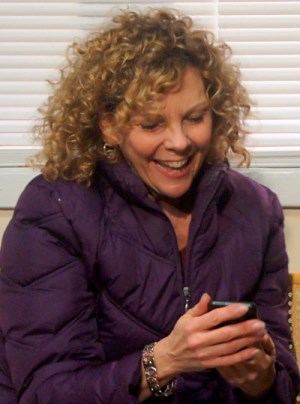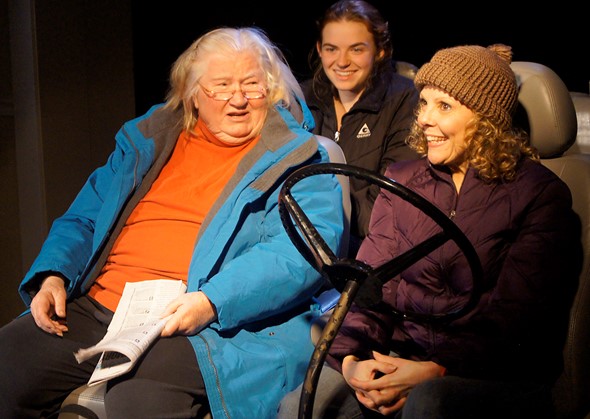Role Playing: Kathleen Ruhl went for laughs, but resisted harsh character that gets them
Interview: An actress who thrives on comedy admits it wasn’t easy to embrace mom’s brutal candor in “Neighbor” at Redtwist Theatre.
By Lawrence B. Johnson
Actress Kathleen Ruhl loves to hear an audience laugh. It’s always been one of the joys of her long stage career. Naturally, in her role as the flinty, straight-talking mom to two adult children in Suzanne Heathcote’s “I Saw My Neighbor on the Train and I Didn’t Even Smile” at Redtwist Theatre, she savors the laughter that rings off those close walls. But for Ruhl, the mirth came in a bitter pill.
“A lot of actors want to play the bad guy, but I’ve never liked that,” says Ruhl, the real-life mom of playwright Sarah Ruhl. “This play disturbed me before we really got it going. I knew all those terrible things Daphne (the mom she plays) says were great laugh lines. But in real life, those would be such mean things to say. I was worried the audience would eventually stop laughing – that they would begin to think, ‘What a bitch.’”
 In Heathcote’s play about a severely dysfunctional family, Daphne is the acerbic, slashing, all-too-ready commentator on the messed-up lives of her kids Jamie (played by Adam Bitterman) and Rebecca (Jacqueline Grandt). The narrative begins with Jamie playing a familiar angle, cajoling his sister into taking responsibility for his teenage daughter Sadie (Emma Maltby) while he sallies off to Hawaii to get married – yet again.
In Heathcote’s play about a severely dysfunctional family, Daphne is the acerbic, slashing, all-too-ready commentator on the messed-up lives of her kids Jamie (played by Adam Bitterman) and Rebecca (Jacqueline Grandt). The narrative begins with Jamie playing a familiar angle, cajoling his sister into taking responsibility for his teenage daughter Sadie (Emma Maltby) while he sallies off to Hawaii to get married – yet again.
This impromptu relocation of Sadie from California to Chicago is doubly urgent: The girl made a sex video with two guys at her high school, and their little production went viral. So Sadie, neglected by her father and angry at the world, shows up in Chicago winter dressed for LA spring, and defying everyone to make her care about anything. Looming up in the midst of this charged situation, like an unavoidable boulder of reality, is Ruhl’s imposing and unyielding Daphne.
“Actually, Daphne and this troubled girl are not all that different,” says Ruhl. “Very early in rehearsals, the director (Erin Murray) told me to be careful not to show feelings on my face. Sadie wears that sort of mask, too. And she speaks her mind. She’s very direct. That’s where she and Daphne connect. I think Daphne respects the girl’s toughness – and wishes her own daughter Rebecca could be more like that.”
 Even though the actors are virtually rubbing knees with the audience seated along the walls in Redtwist’s tiny space, Ruhl says she’s never quite sure whether viewers pick up on the motives behind Daphne’s rough demeanor. This woman, she says, has come to understand the world as a hard place where strength of character is essential for survival – and vulnerable souls like Rebecca can get swallowed up.
Even though the actors are virtually rubbing knees with the audience seated along the walls in Redtwist’s tiny space, Ruhl says she’s never quite sure whether viewers pick up on the motives behind Daphne’s rough demeanor. This woman, she says, has come to understand the world as a hard place where strength of character is essential for survival – and vulnerable souls like Rebecca can get swallowed up.
“I don’t know if it’s clear to the audience that when Rebecca is finally able to stand her ground with Jamie – and me – that Daphne thinks this is a good thing,” Ruhl says. “What Daphne is trying to do is toughen her up, to help her withstand the slings and arrows of fortune. Rebecca won’t stand up for herself. She’s always caving in.
“I think Daphne’s read of Rebecca is probably accurate. When Daphne says the hurtful things, she’d like Rebecca not to fall apart, but to talk back to her. Somehow I guess she feels Rebecca will make her way in the world better if she is not so timid. Rebecca says she doesn’t want to talk to the man on the train, because then what would they talk about the next day? How can you build any kind of relationship thinking like that?
 “Daphne is probably so hard on the kid, Sadie, because her desperate attempt to get attention with the porn video wasn’t very smart. And then she shows up in a Chicago winter and won’t even wear a jacket. Again, not very smart.”
“Daphne is probably so hard on the kid, Sadie, because her desperate attempt to get attention with the porn video wasn’t very smart. And then she shows up in a Chicago winter and won’t even wear a jacket. Again, not very smart.”
But it turns out that Sadie is very smart indeed, along lines that reinforce a spiritual kinship with fire-breathing Daphne. In the play’s most touching vignette, Sadie learns a crucial fact about Daphne that should bring the two women closer, but a distraction shatters the moment, and Daphne’s hard veneer cracks.
“Daphne is more nuanced than meets the eye,” says Ruhl of the grandmother. “We don’t know about her childhood except that she had to quit college because her mother was sick, and that it changed the direction of her life. Now her daughter, who is in therapy, says Daphne uses humor to deflect. That’s probably true. Still, Daphne insists that she’s not ashamed of anything she’s done, even though she also knows she has made mistakes – her connections with her children are not satisfying.
“Maybe the best line in the play is when she says to her son Jamie, who has been so neglectful of Sadie: ‘If you’re not careful, Sadie is going to feel about you the way you feel about me, and you don’t want that. Believe me.’”
 In the beginning of the play, says Ruhl, each of these women from three generations is, in one way or another, stuck. “By the end,” she says, “they get a little unstuck. There’s a scene where Rebecca tells her mother, ‘You don’t seem like you want me to be happy. My therapist says I need more positive affirmation.’ And Daphne is willing to go with that. There’s a softening that happens in her.”
In the beginning of the play, says Ruhl, each of these women from three generations is, in one way or another, stuck. “By the end,” she says, “they get a little unstuck. There’s a scene where Rebecca tells her mother, ‘You don’t seem like you want me to be happy. My therapist says I need more positive affirmation.’ And Daphne is willing to go with that. There’s a softening that happens in her.”
As for getting laughs from terse, breathtaking honesty, Ruhl says she eventually found a way to look at Daphne that made her less daunting:
“This play reminds me of (David Lindsay-Abaire’s) ‘Good People.’ A lot of the dialogue has the same quality. It’s not really mean, it’s just the way they talk, an Irish style of conversing – by jabbing at each other. I’m sure Daphne would fit right in.”
Related Links:
Review of “I Saw My Neighbor on the Train”: Read it at Chicago On the Aisle
More Role Playing Interviews:
- Kate Fry’s vivid Emily Dickinson sprang from poet’s fine-tuned, evocative verse
- Joel Reitsma drew moral profit from banker-captor clash of ‘Invisible Hand’
- Lawrence Grimm found Lincoln first in pages of history, then within himself
- Cristina Panfilio spreads wings she didn’t know she had as midsummer Puck
- Tyla Abercrumbie was set to run little ‘Hot Links’ café, but why was she there?
- AnJi White, as Catherine Parr, learned to keep her wits – to keep her head
- Adam Bitterman, unlikely florist in ‘Seedbed,’ dug deep to create a rare bloom
- Danny McCarthy, pushing broom in ‘The Flick,’ finds vital pulse in long silences
- Mierka Girten, actor with MS, knows wound behind her character’s scars
- Sandra Marquez, as Clytemnestra, sees an exceptional woman in the Greek queen
- Brian Parry says he summoned courage before wit as George in ‘Virginia Woolf’
- Tracy Michelle Arnold debunks madness as force that drives Blanche DuBois
- Christopher Donahue, as Ahab, finds sea’s depth in sadness of a vengeful soul
- Lance Baker embodies ennui, despair of fugitive Jews in ‘Diary of Anne Frank’
- Francis Guinan embraces conflict of father who fled from grim truth in ‘The Herd’
- Sophia Menendian reached back (but not far) as plucky Armenian refugee of 15
- Lindsey Gavel’s distressed Masha, in ‘Three Sisters,’ began with a touch of cheer
- Hollis Resnik felt personal bond with zealous, skeptical scholar in ‘Good Book’
- A.C. Smith is ready undertaker, lord of diner world in ‘Two Trains Running’
- Lia D. Mortensen’s intense portrait of a mentally failing scientist holds mirror to life
- Siobhan Redmond sees re-formed Lady Macbeth as valiant queen in ‘Dunsinane’
- Eileen Niccolai harnessed a storm of emotions to create spark in Williams’ Serafina
- Steve Haggard, aiming at reality, strikes raw core of grieving man in ‘Martyr’
- Shannon Cochran found partners aplenty in sardonic, twice-told ‘Dance of Death’
- Natalie West scaled back comedy to nail laughs, touch hearts in ‘Mud Blue Sky’
- Dave Belden, actor and violinist, adjusted pitch for ‘Charles Ives Take Me Home’
- Joseph Wiens starts at full throttle to convey alienation of ‘Look Back in Anger’
- Shane Kenyon touches charm and hurt of lovable loser in Steep’s ‘If There Is’
- Ramón Camín sees working class values in Arthur Miller’s tragic Eddie Carbone
- Hillary Marren’s charming, rapping witch in ‘Woods’ shapred by hard work, free play
- Mary Beth Fisher embraces both hope, despair of social worker in ‘Luna Gale’
- Brad Armacost switched brothers to do blind, boozy character in ‘The Seafarer’
- Karen Woditsch shapes vowels, flings arms to perfect portrait of Julia Child
- Ora Jones had to find her way into Katherine’s frayed world in ‘Henry VIII’
- Kareem Bandealy tapped roots, hit books for form warlord in ‘Blood and Gifts’
- Eva Barr explored two personas of Alzheimer’s victim to find center of ‘Alice’
- Darrell W. Cox sees theater’s core in closed-off teacher of ‘Burning Boy’
- Chaon Cross turned Court stage into a romper room finding answers in ‘Proof’
- Dion Johnstone turned outsider Antony to bloody purpose in ‘Julius Caesar’
- Noir films gave Justine Turner model for shadowy dame in ‘Dreadful Night’
- Anish Jethmalani plumbs agony of good man battling demons in ‘Bengal Tiger’
- Gary Perez channels his Harlem youth as quiet, unflinching Julio in ‘The Hat’
- Kamal Angelo Bolden sharpened dramatic combinations to play ‘The Opponent’
- In wheelchair, Jacqueline Grandt explores paralysis of neglect in ‘Broken Glass’
- James Ridge thrives in cold skin of Shakespeare’s smiling serpent, Richard III
- Stephen Ouimette brews an Irish tippler with a glassful of illusions in ‘Iceman’
- Ian Barford revels in the wiliness of an ambivalent rebel in Doctorow’s ‘March’
- Chuck Spencer flashes a badge of moral courage in Arthur Miller’s ‘The Price’
- Rebecca Finnegan finds lyrical heart of a lonely woman in ‘A Catered Affair’
- Bill Norris pulled the seedy bum in ‘The Caretaker” from a place within himself
- Diane D’Aquila creates a twice regal portrait as lover and monarch in ‘Elizabeth Rex’
- Dean Evans, in clown costume, enters the darkness of ‘Burning Bluebeard’
- Dan Waller wields a personal brush as uneasy genius of ‘Pitmen Painters’
- City boy Michael Stegall ropes wild cowboy in Raven Theatre’s ‘Bus Stop‘
- Brent Barrett is glad he joined ‘Follies’ as that womanizing, empty cad Ben
- Sadieh Rifai zips among seven characters in one-woman “Amish Project”
- Kirsten Fitzgerald inhabits sorrow, surfs the laughs in ‘Clybourne Park’
- Janet Ulrich Brooks portrays a Russian arms negotiator in ‘A Walk in the Woods’
Tags: Adam Bitterman, Emma Maltby, Erin Murray, Jacqueline Grandt, Kathleen Ruhl, Sarah Ruhl, Suzanne Heathcote


